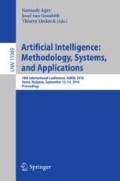Abstract
The paper presents a new supervised approach for solving the all-words sense disambiguation (WSD) task, which allows avoiding the necessity to construct different specialized classifiers for disambiguating different target words. In the core of the approach lies a new interpretation of the notion ‘class’, which relates each possible meaning of a word to a frequency with which it occurs in some corpora. In such a way all possible senses of different words can be classified in a unified way into a restricted set of classes starting from the most frequent, and ending with the least frequent class. For representing target and context words the approach uses word embeddings and information about their part-of-speech (POS) categories. The experiments have shown that classifiers trained on examples created by means of the approach outperform the standard baselines for measuring the behavior of all-words WSD classifiers.
Access this chapter
Tax calculation will be finalised at checkout
Purchases are for personal use only
Notes
- 1.
- 2.
In cases, when the training set is not available, SemCor [4], for example, may be used as a default training set.
- 3.
Moreover, we assume that all words (both in training and testing sets) that have no their embeddings are removed from the corresponding sets.
- 4.
- 5.
- 6.
- 7.
- 8.
- 9.
WN30WNGWN30glConOneGraphRelSCOne-synsetEmbeddings.bin downloaded from http://bultreebank.org/en/DemoSem/Embeddings.
- 10.
- 11.
- 12.
- 13.
- 14.
It is clear, that the WNFS baseline for such extended test set will be also changed.
References
Mallery, J.C.: Thinking about foreign policy: finding an appropriate role for artificial intelligence computers. Ph.D. dissertation. MIT Political Science Department, Cambridge, MA (1988)
Navigli, R. Word sense disambiguation: a survey. ACM Comput. Surv. 41(2) (2009). Article 10
Fellbaum, C.: WordNet and wordnets. In: Brown, K., et al. (eds.) Encyclopedia of Language and Linguistics, 2nd edn., pp. 665–670. Elsevier, Oxford (2005)
Miller, G.A., Leacock, C., Tengi, R., Bunker, R.T.: A semantic concordance. In: Proceedings of the ARPA Workshop on Human Language Technology, pp. 303–308 (1993)
Kuchera, H., Francis, W.N.: Computational Analysis of Present-Day American English. Brown University Press, Providence (1967)
Pilehvar, M.T., Navigli, R.: A large-scale pseudoword-based evaluation framework for state-of-the-art Word Sense Disambiguation. Comput. Linguist. 40(4), 837–881 (2014)
Raganato, A., Camacho-Collados, J., Navigli, R.: Word sense disambiguation: a unified evaluation framework and empirical comparison. In: Proceedings of the 15th Conference of the European Chapter of the Association for Computational Linguistics: Volume 1, Long Papers, pp. 99–110 (2017)
Lesk, M. Automatic sense disambiguation using machine readable dictionaries: how to tell a pine cone from an ice cream cone. In Proceedings of the 5th SIGDOC, New York, NY, pp. 24–26 (1986)
Chen, X., Liu, Z., Sun, M.: A unified model for word sense representation and disambiguation. In: Proceedings of EMNLP, pp. 1025–1035 (2014)
Camacho-Collados, J., Pilehvar, M.H., Navigli, R.: Nasari: integrating explicit knowledge and corpus statistics for a multilingual representation of concepts and entities. Artif. Intell. 240, 36–64 (2016)
Agirre, E., Soroa, A.: Personalizing Pagerank for word sense disambiguation. In: Proceedings of 12th Conference of the European Chapter of the Association for Computational Linguistics. Association for Computational Linguistics, pp. 33–41 (2009)
Tripodi, R., Pelillo, M.: A game-theoretic approach to word sense disambiguation. arXiv preprint arXiv:1606.07711 (2016)
Zhong, Z., Ng, H.T.: It Makes Sense: a wide-coverage Word Sense Disambiguation system for free text. In: Proceedings of the ACL System Demonstrations, pp. 78–83 (2010)
Mikolov, T., Chen, K., Corrado, G., Dean, J.: Efficient Estimation of Word Representations in Vector Space. arXiv preprint arXiv:1301.3781 (2013)
Taghipour, K., Ng, H. T. Semisupervised word sense disambiguation using word embeddings in general and specific domains. In: Proceedings of NAACL HLT, pp. 314–323 (2015)
Rothe, S., Schutze, H.: AutoExtend: extending word embeddings to embeddings for synsets and lexemes. In: Proceedings of ACL, Beijing, China, pp. 1793–1803 (2015)
Iacobacci, I., Pilehvar, M.H., Navigli, R.: Embeddings for word sense disambiguation: An evaluation study. In: Proceedings of ACL, Berlin, Germany, pp. 897–907 (2016)
Melamud, O., Goldberger, J., Dagan, I.: Learning generic context embedding with bidirectional LSTM. In: Proceedings of the 20th SIGNLL Conference on Computational Natural Language Learning (CoNLL), pp. 51–61 (2016)
Kageback, M., Salomonsson, H.: Word sense disambiguation using a bidirectional LSTM. arXiv preprint arXiv:1606.03568 (2016)
Yuan, D., Richardson, J., Doherty, R., Evans, C., Altendorf, E.: Semi-supervised word sense disambiguation with neural models. In: Proceedings of COLING, pp. 1374–1385 (2016)
Simov, K., Osenova, P., Popov, A.: Using context information for knowledge-based word sense disambiguation. In: Dichev, C., Agre, G. (eds.) AIMSA 2016. LNCS (LNAI), vol. 9883, pp. 130–139. Springer, Cham (2016). https://doi.org/10.1007/978-3-319-44748-3_13
Zhou, Z-H., Feng, J.: Deep Forest: towards an alternative to deep neural networks. In: Proceedings of the Twenty-Sixth International Joint Conference on Artificial Intelligence (IJCAI-2017), pp. 3553–3559 (2017)
Author information
Authors and Affiliations
Corresponding author
Editor information
Editors and Affiliations
Rights and permissions
Copyright information
© 2018 Springer Nature Switzerland AG
About this paper
Cite this paper
Agre, G., Petrov, D., Keskinova, S. (2018). A New Approach to the Supervised Word Sense Disambiguation. In: Agre, G., van Genabith, J., Declerck, T. (eds) Artificial Intelligence: Methodology, Systems, and Applications. AIMSA 2018. Lecture Notes in Computer Science(), vol 11089. Springer, Cham. https://doi.org/10.1007/978-3-319-99344-7_1
Download citation
DOI: https://doi.org/10.1007/978-3-319-99344-7_1
Published:
Publisher Name: Springer, Cham
Print ISBN: 978-3-319-99343-0
Online ISBN: 978-3-319-99344-7
eBook Packages: Computer ScienceComputer Science (R0)

